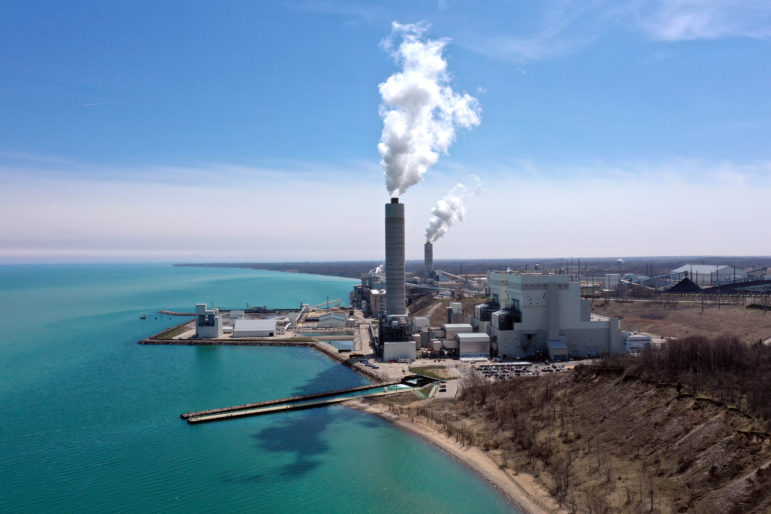We Energies Wastes $75 Million Per Year
While causing more pollution. And then charges customers for it.
Late last year, We Energies‘ well paid, $7-million-a-year executive Gale Klappa announced that the older coal burning plant in Oak Creek would be retired in 2024. This decision is hardly cause for celebration.
The older plant had simply become too costly to operate. For years, We Energies could have been saving $75 million annually simply by purchasing energy from the Midwest grid. To save Wisconsin ratepayers this exorbitant annual expense, We Energies could have–and should have–closed this plant long ago. Another four years until it closes means another $300 million over charge for customers. And, even more costly, it means four more years of polluting our air and water. We Energies and WEC (its parent company), self-proclaimed “good neighbors,” might actually show consideration for the health of all the residents of southeast Wisconsin by shutting down this plant now.
Coal is toxic, start to finish. Coal dust alone is a prime factor in causing breathing problems, such as asthma, bronchitis, emphysema, and COPD. Children and the elderly are especially susceptible to these health dangers. Coal dust blows off the 120-140 cars that make up the many delivery trains, affecting all who live in the vicinity of the tracks. Coal dust blowing off the mountains of coal at the two plants in Oak Creek poisons the air for residents and for everyone living in southeast Wisconsin. This is no exaggeration, as the smallest dust particles (2.5 microns) can be airborne over a radius of thirty miles, an area extending from Milwaukee through Racine and all the way to south Kenosha. These fine dust particles are the most dangerous, as they lodge in the lungs and cannot be expelled by coughing or sneezing.
At the end stage, coal ash (the residue of burned coal) contains large amounts of mercury, arsenic and lead. There is no safe way to dispose of coal ash, which sooner or later leaches into groundwater and wells or finds its way (sometimes by being dumped secretively) into rivers and streams. The other threat from the end stage of coal energy comes from the plants’ daily effluent discharge. The water pumped out into Lake Michigan every day contains those same carcinogenic metals at levels well above safety limits and which have been accumulating for decades.
And none of this is new information. Not to the fossil fuel industry. And not to the climate scientists. What is new is the just-released national report and research tool by the Sierra Club, a report “which grades the 50 largest investor-owned utilities across the country based on their current plans for the next decade for retiring coal plants, investing in clean energy and canceling plans for construction of new gas plants.” We Energies and WEC Energy Group are included among the 50, which are graded on the basis of “Planned Clean Energy vs. Existing Fossil Generation.” On a scale of 1-100, We Energies receives a “D” (23 points), and WEC an “F” (17 points). And these two energy producers supply all of eastern Wisconsin— from Green Bay south to Kenosha — with energy almost entirely generated from fossil fuel.
Most troublesome of all is that We Energies continues to offer no information about when it might consider retiring the larger of the two Oak Creek coal plants. Not a target date. Not a hint. Only a stated intention to continue operating its massive 1300 MW Elm Road Generating Station through 2050. With 2030 being the scientifically agreed-upon date for ceasing all fossil fuel production to save our planet from going past the tipping point for climate disaster, We Energies and WEC are promising to go 20 years beyond that deadline with continued pollution. That mountain of coal will continue to expel toxic dust into the air and our lungs for decades to come. That monster of a coal plant will continue to produce coal ash and continue to discharge, every day, its devil’s cocktail of mercury, arsenic and lead into our Great Lake. That plant must stop burning coal by 2030 and it must begin its transition to clean, renewable energy immediately. By doing this, We Energies and WEC won’t suffer: they will continue to reap large profits, but our lives will be healthier and so will our planet.
Is that too much to ask? Is it really, Mr. Klappa?
Carl Lindner is an Emeritus Professor, University of Wisconsin-Parkside
Op-Ed
-
Wisconsin Candidates Decry Money in Politics, Plan to Raise Tons of It
 Dec 15th, 2025 by Ruth Conniff
Dec 15th, 2025 by Ruth Conniff
-
Trump Left Contraceptives to Rot; Women Pay the Price
 Dec 8th, 2025 by Dr. Shefaali Sharma
Dec 8th, 2025 by Dr. Shefaali Sharma
-
Why the Common Council’s Amended Budget is Good Policy for Milwaukee
 Nov 20th, 2025 by Alds. Marina Dimitrijevic and Russell W. Stamper, II
Nov 20th, 2025 by Alds. Marina Dimitrijevic and Russell W. Stamper, II





















